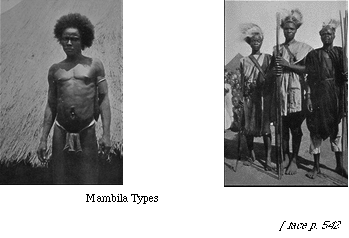 it was apparently the Mambila rule that no one could become a chief who was not the offspring of an exchange marriage.
it was apparently the Mambila rule that no one could become a chief who was not the offspring of an exchange marriage.543
As regards inheritance of chieftainship[47]  it was apparently the Mambila rule that no one could become a chief who was not the offspring of an exchange marriage.
it was apparently the Mambila rule that no one could become a chief who was not the offspring of an exchange marriage.
The question of the mode of inheritance of witchcraft will be dealt with later.
Before leaving the subject of marriage reference may be made to a Mambila custom which is probably common enough among other pagan tribes, though I have only observed it among the Malabu and Jirai peoples north of the Benue. By this custom it is permissible for a man to have sexual relations with the wife of any senior member of his father's or mother's group [48]  . The custom is carried so far that a husband who has to absent himself from home will call upon a younger relative to sleep with his wife during his absence [49]
. The custom is carried so far that a husband who has to absent himself from home will call upon a younger relative to sleep with his wife during his absence [49]  . I have discussed this subject at some length in my report on the Malabu tribe and it need only be mentioned here that among the Mambila there is no organization (as among the Malabu) by which a number of kindreds have a community (or form of community) of wives. But the Mambila observe the rule that no one may have sexual relations with the wife of a brother or half-brother, or with the wife of a father or maternal uncle. Sons frequently have sexual relations with their fathers' wives, but these relations are considered improper and are carried out sub rosa.
. I have discussed this subject at some length in my report on the Malabu tribe and it need only be mentioned here that among the Mambila there is no organization (as among the Malabu) by which a number of kindreds have a community (or form of community) of wives. But the Mambila observe the rule that no one may have sexual relations with the wife of a brother or half-brother, or with the wife of a father or maternal uncle. Sons frequently have sexual relations with their fathers' wives, but these relations are considered improper and are carried out sub rosa.
It may be of interest to give now a brief illustration of the constitution of a family group. The group chosen is that of a family at Kuma, the present head of which is Wondem. It consists of the following members:
(1) Wondem, son of Wanbonga [50]  (deceased), by a slave wife.
(deceased), by a slave wife.
(2) Tiso, son of Chembira, by a woman married under the purchase system.
(3) Shomo, son of Chembira, by a woman married under the purchase system.
These three with their wives and children occupy a single compound.
(4) Kunu, son of Wanbonga, by a slave wife (but not the same wife as the mother of Wondem).
(5) Bike, son of Wankurip [51]  (deceased), by a woman married under the exchange system. Wankurip's father was a brother of Wanbonga.
(deceased), by a woman married under the exchange system. Wankurip's father was a brother of Wanbonga.
These two, with their wives and children, occupy a single compound.
(6) Tam, son of Michir, a daughter of Wanbonga's younger brother Gedi.
Michir was married under the purchase system.
Plate 56 